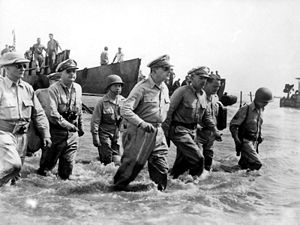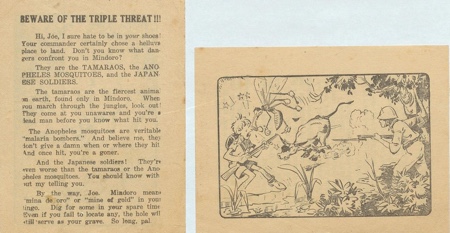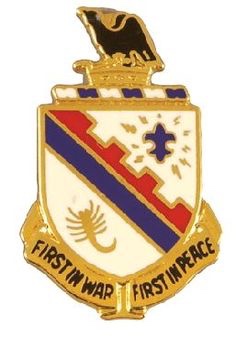Recap: With blood and sweat and steel the Japanese had been driven from the Solomons. For actions in the jungle of New Georgia, Sergeant Charles Boughner, an Iowa-born soldier with the 161st Regiment of the Washington National Guard and the 25th Infantry Division had garnered the Purple Heart and a Silver Star. The men of the Tropic Lightning division would next join American forces going back to the Philippines where they would engage in 165 days of continuous combat and suffer the most casualties of any division in Sixth Army.
The Philippines
On January 11, 1945, the 25th Division landed on Luzon in the Philippines. They were assigned to I Corps and moved to protect the left flank of the U. S. Sixth Army as it drove for Manila. It a homecoming of sorts for the 161st Regiment. Forty-six years earlier, as the 1st Washington Volunteers, they had landed in the Philippines to help suppress the Philippine Insurrection.
“Four days after we hit the beach we were about four miles in at a little town about the size of Bells [Texas] and we were pinned down. We were on one side of the street and they [the Japanese] were on the other. We were running short of ammunition so I went back to the beach to get some. About the time I got there, that’s when General McArthur came wading ashore.”

Boughner had another meeting with the General of the Army the next day at A Company headquarters. “I was back at the HQ talking with the company commander when McArthur drove up in a jeep. He wanted to see what was holding things up and why we couldn’t move. While he was there a fire fight broke out a couple of blocks up and he decided he’d seen enough and went back.”
But for Boughner and A Company there was no going back, only forward and into whatever the future held. “At one point we liberated a POW camp with survivors from the Bataan Death March. It took us five days to get to it and take out the men that were left.”
Caves and Trails
The war took on a new hazard when Boughner and his company moved into the mountains. Like the tunnel rats who descended into the underground bunkers in Viet Nam to ferret out a well-hidden foe, the soldiers of the 161st, had to crawl into dark caves to find the enemy before they could dispatch them.
“One cave was so elaborate; they had built in from the backside of the mountain and dug through the mountain and they had holes on the face. They had a little narrow gauge railroad built in there and a short-barreled artillery piece they could roll around on the rails. They’d push it out and fire on the road down below and then pull back and move to another hole. You couldn’t tell where the fire was coming from.”
In the caves, Boughner and a buddy developed a technique for their new job. They would slip in the entrance, create a disturbance of some sort and cut loose at the muzzle flashes of the Japanese guns when the enemy fired at the noise. It was not a job designed for a long and healthy life, but in the caves and later on a trail through the jungle, Boughner seemed to guarded from above.

“One time in the mountains we got stuck. They had something down in the valley they wouldn’t give up and we couldn’t fight through, so the captain told me to take some men and see what was down there. I took six men down this little trail.
“We didn’t know that the Japanese had a machine-gun on another hill that could cover a portion of that trail. They let us go down, but when we came back they opened up. All six of those guys fell just like you’d turned a weed eater into a pile of grass.
“I fell right amongst them but I didn’t have a scratch. I was right there among those dead men while they raked that trail three times. I couldn’t move, it was like I was paralyzed, but I think it was like the good Lord looking out for me. If I’d have moved I’d have been dead. My lungs were on fire and I couldn’t breath and I couldn’t move. I’d never been through anything like that before.
“Finally I felt a tingling come back into my body and got my strength back. I knew when I came up I had to come up fast or he’d eat me up with that machine gun. Well I came up like a jack-in-the-box, and he cut the grass all around me, but I didn’t get hit. Someway I got up the side of that mountain and back to the company.”
Boughner reported finding a supply dump in the valley, but a major from battalion came down and told him to go back down the trail and bring back proof. “I’m a little short tempered, and right then I was real short tempered, and I told him I wouldn’t take any more men down there, but I’d take him down there, just me and him.” The major decided the report was good enough and went back to battalion. An airstrike hit the dump and knocked it out.

Going Home
Charles Boughner’s war ended on the road to Baguio City. “I was out on the front lines when a company runner found me and said the captain wanted to see me. Well, I’d had so many arguments with him I figured I was in trouble again for some or the other.
“When I got back to the HQ there was a lieutenant I hadn’t seen before with a paper in his hand. He looked at my dog tag, started asking me a bunch of questions and stuff, and I asked ‘What’s the problem?’ He said, ‘’There ain’t no problem. Your war’s over. You’re going home.’”
Boughner’s recounting of the moment stopped, and he begged pardon for the tears that welled up in his eyes and the catch that swallowed his voice. He took a long pause; it was 1945 again as the memories flood back. “I’m sorry,” he said. “It was sixty years ago, and I still cry when I think about it.” He composed himself and it was Denison, Texas again and not a place on the road to Baguio City.
“I asked him when, and he said right now, and I said let’s go. I followed him like a puppy dog. The captain said ‘Don’t worry, we’ll take care of your men.’”
The lieutenant had a jeep, and he took Boughner to a camp in the flat lands where there were some other soldiers waiting to go home. He slept on a cot instead of a hole in the ground for the first time in longer than he cared to remember. From there he flew on a converted bomber from Luzon to Leyte then to the beach and a “ratty old ship,” that was eastward bound. It was twenty-two days from the Philippines to San Francisco.
“That old ship only had one engine that worked. You could have probably got out and walked almost as fast, but we didn’t care. We were going in the right direction and we were going home.”
***
After his discharge, Charles Boughner went home to Iowa where he worked as a policeman and deputy sheriff for a while. Later he started and ran several taxicab companies. While on a job in Fort Worth, he met a girl from Texas, and when all was said and done he ended up in Denison. He was an auto mechanic, and for much of his lifetime here, a builder and home repair man.
He lived in a small house outside of Denison with his wife and his collections of stuff. “I’m not so much a collector, as an accumulator.” He became a painter and examples of his work covered the walls. He wrote of his wartime experiences for the edification of his grandchildren, and was active in the Grayson County Purple Heart Society. “It’s been a good life,” he said. And considering what he had been though, he should know.